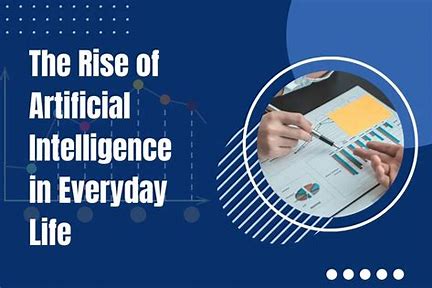AI Among Us: How Artificial Intelligence Is Quietly Reshaping Everyday Life in Ghana and Beyond
By Rebecca Aboagyewah Oppong | Veebeckz Tech Media | Published on 22nd September, 2024
Executive Summary
Artificial Intelligence (AI) isn't a futuristic fantasy—it's already here, quietly powering everyday experiences. From voice assistants and loan approvals to medical diagnostics and traffic apps, AI is becoming a central part of life in Ghana and across the globe. This article explores how AI is embedded in daily routines, the industries it's transforming, and the ethical questions it raises.
Introduction: AI is No Longer Just Science Fiction
Just a few years ago, Artificial Intelligence sounded like something out of a sci-fi movie. But today, it’s everywhere—even if you don’t realize it. When Google Maps redirects your route due to traffic, or your phone unlocks using face recognition, AI is at work.
In Ghana, AI is showing up in hospitals, classrooms, fintech apps, and even on the farm. As it becomes part of everyday life, the question shifts from "Will AI affect me?" to "How do I live smarter with it?"
1. Personal Assistants: Your Pocket AI
Smart assistants like Siri, Alexa, and Google Assistant use AI to understand speech, set reminders, search the internet, and even crack jokes.
Ghanaian context: Many youth and professionals rely on voice search for quick translations, music discovery, and productivity hacks.
Trend: Voice-based interfaces are growing in popularity due to the rise of low-literacy-friendly apps.
2. Fintech and Banking: AI Behind Your Transactions
AI powers fraud detection, credit scoring, and customer service bots in the financial sector.
Apps like Fido Money Lending use AI to analyze non-traditional data (like mobile usage) to approve microloans.
Chatbots are answering customer queries 24/7 for banks and fintech startups.
Why it matters: AI is enabling financial inclusion by evaluating trustworthiness beyond bank records.
3. Healthcare: Diagnosing with Intelligence
AI-driven health tech is diagnosing diseases faster and more accurately.
Zipline uses AI-powered drones to deliver medical supplies in Ghana.
AI algorithms are being trained globally to detect tuberculosis, pneumonia, and cancer from medical images.
mPharma uses data to predict drug shortages and track inventory.
Impact: Patients in remote areas are gaining access to services once limited to urban hospitals.
4. Social Media & Content Recommendations
Your TikTok feed, YouTube suggestions, and Facebook friend recommendations are curated by AI.
AI analyzes your behavior to personalize your content stream.
Ghanaian creators are now tailoring their videos using insights from these algorithms to reach broader audiences.
Caution: While this improves engagement, it can also create echo chambers.
5. Smart Agriculture
AI isn’t just for Silicon Valley—it’s on the farm.
IoT sensors combined with AI help monitor crop health, predict weather patterns, and recommend fertilizer use.
Ghanaian startups are integrating AI into platforms like Agrocenta to optimize farming decisions.
Result: Increased yield, lower cost, and smarter farming—even for small-scale producers.
Challenges & Ethical Questions
While AI offers powerful benefits, it also raises concerns:
- Job displacement due to automation
- Bias in algorithms—if not trained on diverse data, AI can make unfair decisions
- Data privacy—how is your personal data being used?
Solution: More inclusive AI development and regulatory oversight are critical in ensuring AI serves everyone fairly.
Conclusion: Embrace It, Understand It
AI is not a distant innovation—it’s a present-day reality. The more we understand it, the better we can use it to improve our lives, solve community challenges, and drive African innovation. AI is here—and it’s time we build, adapt, and lead with it.
